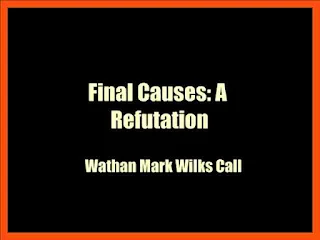Final Causes: A Refutation
The Essay on Final Causes was commenced nearly twenty years ago. For reasons unnecessary to specify, it has remained unfinished till recently. The plausibility of the Design argument at first captivated, then bewildered, and finally dissatisfied me.
"On religion, in particular, the time appears to me to have come when it is the duty of all who, being qualified in point of knowledge, have on mature consideration satisfied themselves that the current opinions are not only false but hurtful, to make their dissent known."— John Stuart Mill.
Nearly twenty years have elapsed since my silent withdrawal from the quiet duties and unpretending social position of a curate of the English Church. Increased acquaintance with theological controversy has served only to strengthen the convictions which necessarily resulted in this withdrawal.
At length, the time appears to have arrived for giving audible expression to those reasons which impelled me to recede from the circle of orthodox belief, or which still preclude my return. Abstaining from a formal and systematic investigation of the claims of dogmatic Christianity, I content myself with a recital of the reasons which induced me to abandon a creed consecrated by the traditions and services of two thousand years.
This recital will naturally assume the form of a mental autobiography. A few fragmentary passages from the imperfectly-recalled history of early years will best illustrate both the devout faith of childhood and the ignorant scepticism of boyhood, which. transitory as it proved, yet served as a rehearsal for the instructed unbelief of mature age.
A strong natural bias, if not to doctrinal religion, at least to religious sentiment, not unaccompanied with a certain imaginative activity, was a leading characteristic of my early years. I recall an incident of those years which, trivial in itself, exercised a powerful and permanent impression on my mind. Wandering, after the fashion of children, over the house in which I lived, I chanced to stray into a room where a woman sat reading, in a low voice, of strange sights and beautiful shapes beheld in vision — I knew not where, or when, or by whom. I listened as one enchanted. The Book from which she read was the Bible.
Thirsting to know more of the glorious phantom-world of which I had caught a glimpse, I one day carried off the coveted volume, and henceforward, morning after morning, I sat alone, evoking splendid pictures of Oriental life and adventure from the magic pages of the mystic book, or peopling my solitary retreat with the visionary forms of a dreaming prophet, majestic patriarch, heroic king, or pastoral princess.
This grave delight in the poetic and narrative portions of " The Old Testament " was succeeded by the severer interest which the story of " The New Testament" awakened. Though the religious enthusiasm thus excited endured through many years, it was not destined to survive the development of the sceptical tendencies which had been dormant in my mind. At this distance of time, I can but reunite the scattered traces of half-conscious thought or obscure feeling, which preceded and prepared the determinate scepticism of advancing years
. A schoolfellow had once avowed in my hearing his disbelief in a material hell. Another young acquaintance had objected to the anti-scientific cosmogony of Genesis, instancing the existence of light, with the division of day and night, before the creation of the sun.
A volume of theology had been given me to read, containing an elaborate argument to prove, what I had never doubted, the being of a God. The conception of God as a First Cause, on which the author laid great stress, appeared to be destructive of the personal and affectional nature of the Deity and to leave in its place a cold impassive entity. Speculation on the possible fate, in another world, of Lord Byron, the favourite poet of my youth, pronounced by the pious to be hopelessly lost, probably inclined me to waver views on the subject of posthumous retribution.
Contents:
PREFACE vii
AUTOBIOGRAPHY
I. HISTORICAL REVIEW — INTRODUCTORY... I
II. NATURAL THEOLOGY, ITS DIVISIONS AND SUBDIVISIONS —
STATEMENT AND COUNTER-STATEMENT ... 9
III ORDER AND GENERAL ADAPTATION — FUTILITY OF THE TELEOLOGICAL ARGUMENT 24
IV. SPECIAL ADAPTATIONS 37
V. COINCIDENCES, CASUALTIES, SINGULARITIES IN NATURE UNDESIGNED — FALLACIOUS REASONINGS REFUTED. 55
VI. DISTINCTIVE CHARACTER OF DESIGN. , ,. 6^
VIL THE EYE 65
VI I L SPECIAL ADAPTATION — THE BEE 75
IX. SPECIAL ADAPTATION — THE BIRD ... . . .82
X. SPECIAL ADAPTATION IN PROVISIONS OF INANIMATE
NATURE— WATER S6
XL THE UNIVERSE AS A WORK OF ART — VOLTAIRE AND PALEY — THE WATCH AND THE WORLD ... 89
XII. THE ABSOLUTE GOD 94
XIII. THE LIMITED OR CONSTITUTIONAL DEITY ... 97
XIV. THE EVOLUTIONARY GOD IO4
XV. EXPLANATORY AND PROSPECTIVE— CHRISTIAN LIFE AND CHRISTIAN DOGMA — THE PHILOSOPHIC LIFE, THEORETIC AND PRACTICAL 153
Notice:
According to Aristotle, the material cause of a being is its physical properties or makeup. The formal cause is the structure or direction of a being. The efficient cause is the thing or agent, which actually brings it about. And the final cause is the ultimate purpose for its being.
the book details :
Download


